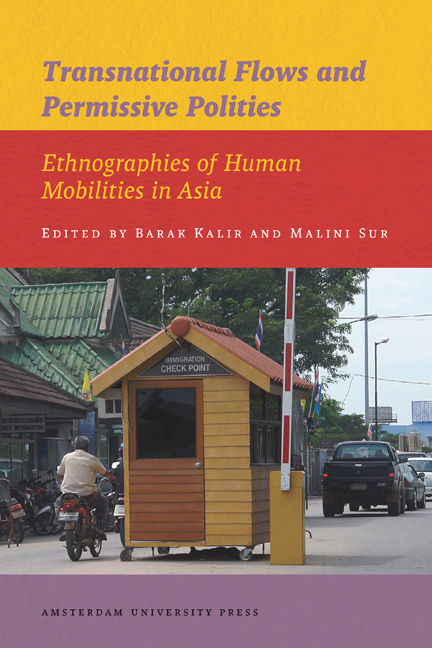Book contents
- Frontmatter
- Contents
- List of Tables, Maps, Figures and Photographs
- Acknowledgements
- Introduction: Mobile Practices and Regimes of Permissiveness
- 1 Illegality Rules: Chinese Migrant Workers Caught up in the Illegal but Licit Operations of Labour Migration Regimes
- 2 Contesting the State of Exception in the Afghan-Pakistani Marchlands
- 3 ‘Looking for a Life’: Rohingya Refugee Migration in the Post-Imperial Age
- 4 Smuggling Cultures in the Indonesia-Singapore Borderlands
- 5 Trade, Transnationalism and Ethnic Infighting: Borders of Authority in Northeast Borneo
- 6 Bamboo Baskets and Barricades: Gendered Landscapes at the India-Bangladesh Border
- 7 Moving between Kerala and Dubai: Women Domestic Workers, State Actors and the Misrecognition of Problems
- 8 Emigration of Female Domestic Workers from Kerala: Gender, State Policy and the Politics of Movement
- 9 Mainland Chinese Migrants in Taiwan, 1895-1945: The Drawbacks of Being Legal
- 10 ‘Playing Edge Ball’: Transnational Migration Brokerage in China
- Epilogue: Irregular Mobilities and Disjunctive Moralities
- About the Editors and Contributors
- Bibliography
- Index
- Publications Series
Epilogue: Irregular Mobilities and Disjunctive Moralities
Published online by Cambridge University Press: 15 January 2021
- Frontmatter
- Contents
- List of Tables, Maps, Figures and Photographs
- Acknowledgements
- Introduction: Mobile Practices and Regimes of Permissiveness
- 1 Illegality Rules: Chinese Migrant Workers Caught up in the Illegal but Licit Operations of Labour Migration Regimes
- 2 Contesting the State of Exception in the Afghan-Pakistani Marchlands
- 3 ‘Looking for a Life’: Rohingya Refugee Migration in the Post-Imperial Age
- 4 Smuggling Cultures in the Indonesia-Singapore Borderlands
- 5 Trade, Transnationalism and Ethnic Infighting: Borders of Authority in Northeast Borneo
- 6 Bamboo Baskets and Barricades: Gendered Landscapes at the India-Bangladesh Border
- 7 Moving between Kerala and Dubai: Women Domestic Workers, State Actors and the Misrecognition of Problems
- 8 Emigration of Female Domestic Workers from Kerala: Gender, State Policy and the Politics of Movement
- 9 Mainland Chinese Migrants in Taiwan, 1895-1945: The Drawbacks of Being Legal
- 10 ‘Playing Edge Ball’: Transnational Migration Brokerage in China
- Epilogue: Irregular Mobilities and Disjunctive Moralities
- About the Editors and Contributors
- Bibliography
- Index
- Publications Series
Summary
This stimulating set of essays is the result of a long-term comparative project that suggests new ways of conceptualising and studying empirically the key terms of its focus: transnational movement, borders, states and the boundaries of legality and the legitimate. Drawing on the literature from a wide range of disciplines, the contributors invite us to reflect on transnational flows and processes, arguing for an ethnographically grounded perspective and engaging critically with approaches that over-determine the separation between society and the state. At the core of their persuasive critique is a fourfold matrix that maps the cross-cutting relationships among different forms of social regulation (legal, illegal, licit, illicit) and that enables them to focus on activities that, while formally illegal in the eyes of the state, are nevertheless considered broadly acceptable to society more generally or at least to some parts of it. Such ‘permissible’ illegalities – referred to throughout this volume as ‘licit but illegal’ and the least studied of the combinations articulated in the matrix – are regarded as morally unobjectionable and are practiced and even expected in certain circumstances not just by ‘outlaws’ who live beyond the law but by many members of society, including otherwise law-abiding citizens and occasionally even by those responsible for policing such activities. Sometimes these activities recall the apparently inverted moralities played out in gangster movies where crooked cops rub shoulders with honest robbers or where there is ‘honour among thieves’. However, they do more than just blur the moral lines between those on different ‘sides’ of the law. They characterise a world in which the everyday morality that licenses illegality complements and even paradoxically facilitates, as it simultaneously grates against, the legal systems of state and trans-state governance that seek to order human mobility and other global flows. In other words, the contributors argue, activities that are illegal but licit are an elemental and fundamental part of the state and are especially integral to the operation of transnational migration in the various parts of Asia they explore.
The approach to these issues adopted in this collection thus builds upon and extends key developments in contemporary social theory that have sought to transcend the limitations of a state-centric perspective by, for example, seeing the world from the edges-in and the bottom-up.
- Type
- Chapter
- Information
- Transnational Flows and Permissive PolitiesEthnographies of Human Mobilities in Asia, pp. 229 - 240Publisher: Amsterdam University PressPrint publication year: 2012



